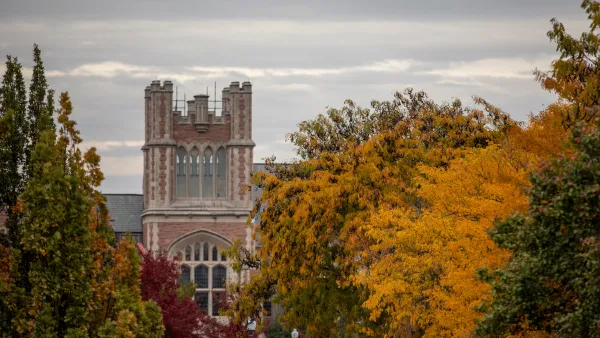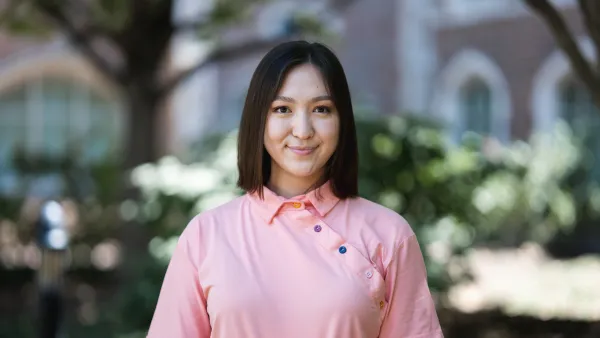From brainwaves to boron nitride, and from mosaic art to superconducting circuits, undergraduate research in the Physics Department at WashU is anything but one-dimensional.
Thanks to the generous support of the M.R. Metzger Family Foundation, students like Jimmy Gu, Yiwen Liu, and Bruce Shen are diving headfirst into big questions – blending disciplines, testing boundaries, and gaining hands-on experience at the frontiers of science. Whether it’s exploring how the brain perceives beauty, refining nanoscale thermal measurements, or paving the way for quantum computing, these students are proving that curiosity, mentorship, and opportunity make a powerful combination.
Mosaics, Minds, and Medical Aspirations
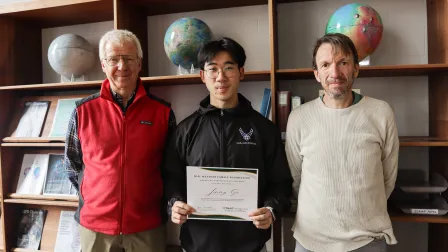
Sophomore physics major and biology minor Jimmy Gu has always been drawn to “exploring and uncovering the fundamental mechanisms that makes things function.” Now, he’s turning that curiosity toward the intersection of physics, neuroscience and art in Professor Ralf Wessel’s lab. “We are attempting to quantify the neurological responses that mosaic art invokes in people in hopes of better understanding how the human brain processes complex understanding of beauty, emotion, and aesthetic valuation,” he said.
Jimmy discovered the project after taking Wessel’s Physics of the Brain course. “I’ve always been a firm believer in taking an interdisciplinary approach to all problems,” he said. “It’s always a joy to see diverse and seemingly unrelated topics come together to form something novel.”
Jimmy sees broader implications in the work. Jimmy hopes this research will help to gain insight into “how something that’s commonly believed to be so subjective and unquantifiable as beauty in mosaic art, can be tied to the complex and vibrant world of science.”
Jimmy works closely with both Wessel and Pradyumma Sepulveda Delgado, a postdoc at Columbia University. “They are both always available to answer any questions I might encounter,” he said. “Professor Wessel has been very accommodating and instructive in the process of mentoring me in both critical scientific inquiry and effective communication.”
After graduation, Jimmy plans to pursue a medical career in the Air Force. “I believe that the diverse and unique perspective that I’m gaining in the mosAIc project will grant me valuable skills to one day serve a great multitude of people.”
Where Heat Meets the Atomically Thin
Yiwen Liu, a sophomore physics major, is drawn to research that bridges fundamental science and real-world impact. “I’ve always believed that fundamental sciences like physics offer the tools to understand and even solve many of the problems we face in the real world,” he said. That belief led him to a project investigating the thermal properties of two-dimensional materials such as hexagonal boron nitride (hBN) and α-RuCl₃.
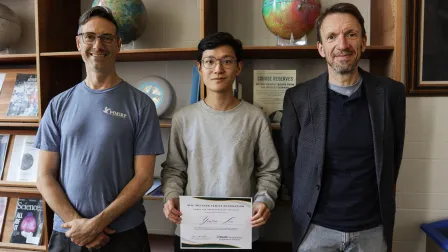
“These materials show unique thermal behaviors at the nanoscale, and understanding how they conduct heat can help inform their potential use in advanced technologies,” Yiwen said. His work focuses on refining experimental techniques to make those measurements “more accessible and reliable.”
He’s particularly excited about the hand-on aspect of the research. “It’s been really interesting to get hands-on experience and understanding how small-scale experiments come together,” he explained.
Yiwen credits Professor Erik Henriksen with helping him launch the project. “Professor Henriksen helped me clarify my direction and provided a solid starting point for my research,” he noted. “That guidance made it much easier to take the first steps and stay focused.”
While still deciding on his long-term goals, Yiwen sees this work as a valuable foundation. He added, “this research is helping me build technical skills and learn how to approach real-world problems through experimentation.”
Superconductors and Quantum Futures
For rising senior Bruce Shen, research is a natural extension of his broad interests in science, technology, and the natural world. A double major in physics and electrical engineering, Bruce is currently working on a project focused on superconducting resonators – a critical step toward advancing quantum computing.
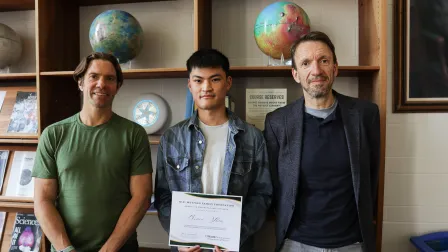
“Specifically, we are exploring the loss mechanisms in resonators made of YBCO, which ultimately contributes to the realization of electron-on-Neon qubit,” he explained. That focus ties closely to his longstanding curiosity. “I’ve always been excited about applying what I learned from class into real world, which leads me to research, and since I am especially interested in quantum science and technology, I eventually chose to work on this project,” he said.
Bruce is especially interested in diving deep into the inner workings of these complex systems. “I’m most excited about understanding the loss mechanisms of superconducting resonators, learning how RF circuits work, and designing high-efficiency resonators,” he noted.
He credits both mentorship and departmental support for helping him launch into this highly technical field. “Dr. [Kater] Murch introduced me to this field, helping me define my research direction and establish a solid foundation, while the department made research opportunities more accessible and supportive,” he said.
Still exploring his long-term goals, Bruce sees this experience as an important step toward a future in quantum technologies. “This research offers a valuable opportunity for me to gain insight into topics related to quantum computing,” he said.
Beyond the Lab: Lasting Impact of Support
What unites these three budding researchers isn’t just their love of physics – it’s their boldness in asking tough questions, their excitement in tackling real-world challenges, and their gratitude for the opportunity to explore. With support from the M. R. Metzger Family Foundation, Jimmy, Yiwen, and Bruce aren’t just learning science – they’re shaping its future. From the lab bench to the big picture, their work reminds us that discovery starts with a spark, and a little support goes a long way.
